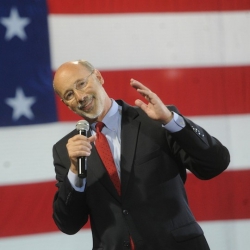Pennsylvania’s House of Representatives passed a bill on Tuesday which would legalize online casinos, poker sites, and daily fantasy sports sites. It marks the closest a U.S. state has gotten to passing online gambling legislation since three states legalizes iGaming in 2013.
The gaming bill won by a narrow majority of only 114-85, but it represents a major step forward. No companion bill exists in the Pennsylvania State Senate, so it is difficult to estimate the level of support the bill has in the Senate.
Before the house bill can be introduced to the Senate, one or more state senators will have to sponsor similar legislation. As the process plays out, US Poker Sites will update the movement of HB 649 in the Pennsylvania Senate.
John Payne’s Direction
Proponents in the House of Representatives, including the bill’s sponsor, John Payne, showed a great deal of legislative deftness in maneuvering HB 649 through the House.
Two weeks ago, lawmakers had tried to attach the online gaming legislation to a controversial video gaming terminal (VGT) bill which likely would have ruined the bill’s chances of passage.
Avoiding the legislative pitfall of the VGT bill gives John Payne’s bill a much better chance of affirmation in the Pennsylvania Senate.
Pennsylvania Senate
Those close to Pennsylvania politics believe the gaming bill has a significant chance of being passed. The Senate is controlled by the Republicans, who are searching for ways to generate revenue without raising taxes. The state has another budget shortfall, after an 8-month standoff in budget negotiations last year.
Analysts believe online gambling would generate $300 million per year for the state. Earlier estimates had online gambling worth $400 million, but the bill could be worth more.
Online Casinos Included
Most estimates of Pennsylvania online gambling have focused on online card rooms, but not online casinos. It was thought that the brick-and-mortar casinos and racinos of Pennsylvania would be against online casinos, because they might represent competition. Still, online casinos have proven more lucrative in New Jersey than Internet poker sites.
John Payne argued in the House that the gaming bill is not an expansion of gambling in Pennsylvania. Instead, it is regulation of an industry which already exists. Unregulated online gambling generates billions of dollars in untaxed revenues for illegal offshore operators. Regulating the industry would give gamblers a legal and safer option, while funneling a lot of the cash to Pennsylvania-based enterprises, instead of offshore operators.
Pennsylvania Gaming Interests Involved
Also, the land-based casinos and racinos of Pennsylvania stand to gain from the bill. Only license holders in the brick-and-mortar casino industry are the ones who will be able to apply for online gambling licenses.
It is unknown whether Gov. Tom Wolf will sign the bill. Gov. Wolf is not a natural advocate of gambling. At the same time, the governor has indicated in the past that he would consider signing an online gaming bill.
Daily Fantasy Sports Bill
The daily fantasy sports statutes also involve online gaming sites, though fantasy sports are a more mainstream pastime. DFS is not the same as fantasy sports itself, but enough legislators have played fantasy football or Rotisserie baseball that many see it as a game of skill — not gambling.
If the bill is passed, it will regulate the industry which is dominated in the United States by two competitors: FanDuel and DraftKings. The two companies have faced a stormy year, in which many public officials have called either for regulations or bans.
Election-Year Politics
Legislation in an election year is fraught with a different kind of peril. While gambling bills in most states are complicated at any time, politicians in an election year must measure every single vote by its immediate impact on the electorate. If a small percentage of a lawmaker’s constituency is likely to take enough offense at a lawmaker’s decision that they will change their vote in November, then that lawmaker is not likely to support a bill.
Votes on gambling are particularly hard to analyze. Instead of following a party line vote, the leaders in each party tends to view gaming votes as a “matter of conscience”. Thus, each politician must be analyzed separately, instead of being part of a bloc of voters.

